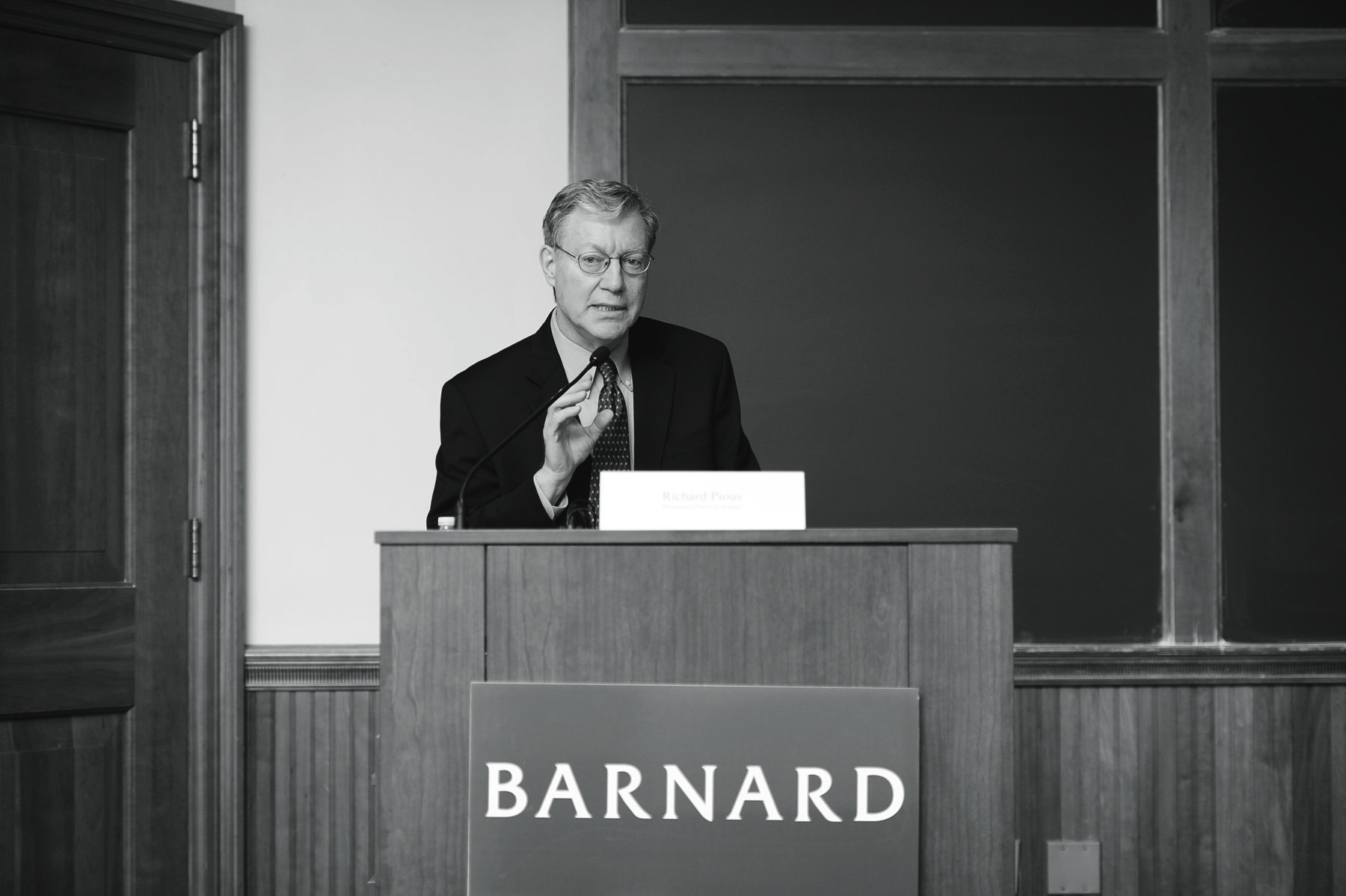Now that the 2012 U.S. presidential race has entered the final stretch, American voters are about to be bombarded with a barrage of campaign ads. The key question obviously is who’s most fit to lead the country. Another question worth asking, however, is why anyone would want the job. While being president most definitely has its perks, it’s not only one of the most grueling jobs on the planet, it’s also almost invariably thankless, according to Richard Pious, professor of political science and Adolph S. and Effie Ochs Chair in History and American Studies. The professor shared his views on the enormous hurdles that those holding the Oval Office face in a 2012 reunion weekend lecture, “Why Presidents Fail.”
 Pious has spent much of his career studying the exercise (and limits) of political and presidential power. Along with teaching courses in American politics and political decision making, he is also the author of several notable books on the U.S. presidency and political system, including The President, Congress, and the Constitution, The American Presidency, and, most recently, Why Presidents Fail: White House Decision Making from Eisenhower to Bush II.
Pious has spent much of his career studying the exercise (and limits) of political and presidential power. Along with teaching courses in American politics and political decision making, he is also the author of several notable books on the U.S. presidency and political system, including The President, Congress, and the Constitution, The American Presidency, and, most recently, Why Presidents Fail: White House Decision Making from Eisenhower to Bush II.
In recent decades serving as president has increasingly become a losing proposition, according to Pious. Despite the lofty campaign rhetoric and high hopes that sweep presidential candidates into office, he pointed out that a host of hard political and practical realities severely limit how much presidents can actually accomplish.
Presidential candidates make big promises about how they will fix the economy, or overhaul Social Security or health care, or resolve intractable foreign-policy disputes. And they may even sincerely intend to keep those promises. The reality is that many of the problems they face are so complex and so intractable that they can’t be solved. At best, they can be managed.
Of course, that hasn’t stopped presidents from trying to tackle ever bigger challenges—and setting themselves up for failure. Recent presidents, he noted, have increasingly put forth policy initiatives aimed at shaking up the existing order, and disrupting the status quo. Pious said that presidents have become more and more ambitious with issues that are more and more difficult to deal with, pointing to George W. Bush’s attempt to privatize Social Security as just one example.
Making the job even tougher, he added, is the fact that at some point in their tenure virtually all presidents also inevitably have to contend with an unexpected out-of-the-blue crisis or series of crises that demand a huge proportion of their time and attention, and can doom a presidency. These so-called “black swan” events run the gamut: Former president Jimmy Carter, for instance, found himself scrambling to deal with skyrocketing oil prices brought on by the OPEC embargo as well as the overthrow of the Shah in Iran. For Bill Clinton, it was the Monica Lewinsky scandal, while George W. Bush had to crisis-manage both 9/11 and the financial meltdown of 2008. As for the Obama administration, Pious noted that the continuing deterioration of the European financial system and the potential collapse of the euro has turned into a serious crisis. Three or four years
ago, no member of his administration was predicting the level of contagion in the eurozone, he added.
Whatever form a given problem or “black swan” event takes, the upshot is that it virtually always wreaks havoc on the best laid presidential plans. Presidents “get pushed off their agenda,” said Pious, who added that even Abraham Lincoln, widely regarded as among the greatest U.S. leaders, was essentially just reacting as the events that precipitated the Civil War played out. “I see Lincoln as a scrambler, as an improviser,” said Pious, who quoted from a letter Lincoln wrote during his presidency, in which he claimed “not to have controlled events, … that events have controlled me.”
Just trying to manage the various crises that come a president’s way can be daunting enough. But Pious noted that the increasingly bitter partisanship and antipathy to political compromise that have arisen in the past couple of decades have made the challenges modern presidents face much harder. Pious said that we have moved from a political age to an anti-political age, and he recalled that during the Eisenhower years most people applauded when Republicans and Democrats struck the compromises required to move the country forward; President Eisenhower himself said that the “best place to be is in the middle of the road.”
President Reagan also recognized the necessity of meeting the Democrats who controlled Congress in the 1980s halfway. “Reagan said ‘If I can get half of what I want, I’ll take it,’” recalled Pious, who added that that sort of moderation has all but disappeared.
“Compromise right now is a dirty word,” said the professor. Instead of being applauded, those who do try to reach across the aisle are viewed as weak and wimpy. The result is Congressional paralysis. Presidents are swimming in a political sea, Pious added, noting that the animus toward normal political give-and-take has made it almost impossible for the White House to get anything done.
Of course, even if Republicans and Democrats were somehow able to put aside their differences and find common ground, the way forward isn’t exactly clear. Indeed, on top of the political animus, Pious believes that modern presidents face a growing “crisis of authority” brought on by the fact that many of the policy prescriptions and theories supplied by so-called “experts” have turned out to be dead wrong. As one example, he recalled that in the run-up to the invasion of Iraq President Bush’s foreign policy advisers predicted that U.S. troops would be hailed as liberators and showered with flowers and sweets. “Not quite,” said Pious.
Likewise, he quoted from a recent newsletter put out by Moody’s Analytics, in which one of the best economic forecasters in the country predicted that job growth through May would be enough to push the economy forward. Instead the number of new jobs created actually plummeted. Pious noted that there are hundreds of examples of the best experts not getting it right.
Given all this, it’s not surprising that presidents have made plenty of mistakes. The problem is that they haven’t been particularly adept at learning from past missteps. “Why is there not a learning curve?” Pious asked. Presidents keep failing to apprehend basic lessons from their predecessors about how to handle corruption issues or the perils of covert operations or of appointing a “jerk,” as he put it, to be White House chief of staff, “It’s like Yogi Berra said, ‘Déjà vu all over again.’ Every White House is using the same script.”
He conceded that there have been at least a few recent presidential success stories. Bill Clinton, for example, did actually manage to balance the federal budget in spite of the Whitewater and Lewinsky scandals, and the poisonous partisanship he faced in Congress. As for Obama, Pious said he also deserves credit for some savvy politicking, but believes he may have overplayed his hand. “I think he tried for too much,” said Pious, adding that in his view the health-care plan was “beyond what the country could sustain.”
How that affects the upcoming presidential elections remains to be seen. In the meantime, though, Pious noted that in the wake of the Supreme Court’s 2010 decision in the Citizens United v. Federal Election Commission, Obama’s opponents have been able to funnel unlimited amounts of anonymous campaign contributions into the race. In the professor’s view, this greatly weakens accountability and undermines the U.S democratic system as a whole. The Citizens United decision was a disaster, affirmed Pious.
